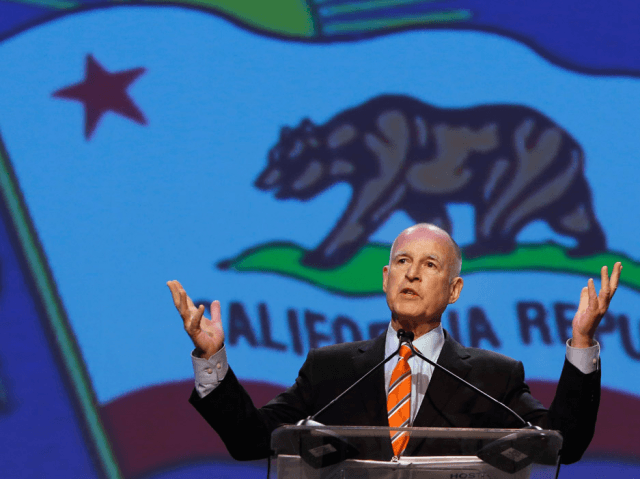Once again, California Gov. Jerry Brown is heading for a confrontation with labor groups, social welfare groups, and Democratic legislators who want Brown to raise taxes and expand spending. The newly re-elected Brown successfully pushed through temporary sales and income taxes three years ago with Proposition 30, but refuses to continue whole-heartedly in that direction, preferring to let the taxes die by 2018.
Brown’s opponents support extending those taxes, as well as taxing services, upping taxes on oil and tobacco, and amending the state’s signature Proposition 13 to increase taxes.
California Calls, comprised of 31 labor union, civil rights and faith groups wants higher taxes, stated that “loopholes’ for the wealthy must be closed. Policy director Veronica Carrizales told Southern California Public Radio: “The governor, he’s sticking with his message of, you know, this new reality, this new normal that everybody has to live within their means. It will take an effort by community groups and other groups to put pressure on the governor. It’s still raining for many people in California.”
Democratic legislator Robert Hertzberg created SB8, which would tax services; Brown has expressed his disapproval.
The Sacramento Bee reported that Brown’s own budget, submitted two weeks ago, pointed out that the private sector rarely accommodates employees with “platinum” health care benefits received by California state employees.
Brown’s administration has stated that at present rates, the estimated $71.8 billion in unfunded medical obligations will mushroom to $300 billion by 2048. His budget calls for present state employees to pay for half of their medical insurance; new employees would have to work longer to earn their retiree health benefits.
Bruce Blanning, executive director of the state’s civil engineers’ union, told the Bee that he’d wait and see exactly what Brown had in mind, asserting, “Well, in general, health insurance premiums are paid at the time you need health coverage. So that $300 billion sounds ominous. If the governor wants to set aside money ahead of time, that’s fine. But if he wants to take a chunk out of employees’ paychecks now, that’s a problem.”
The Brown budget argues that if a program existed state-wide for unions to contribute to a special pension-style medical benefits trust fund, California could put up $600 million each year to share the burden, but “but ultimately (it would) decrease the retiree health care liability, saving billions of dollars in the long term.”
Standard & Poor’s rating service estimated California’s unfunded retiree health promises in 2012 at $1,721 per resident, the highest in the nation except for New York.

COMMENTS
Please let us know if you're having issues with commenting.